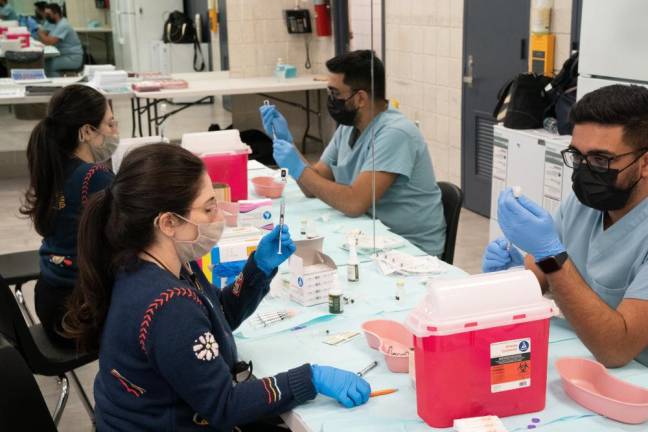Vacillating on Vaccines
Why are some New Yorkers still refusing the shots?

As supplies of vaccine and the number of vaccinated New Yorkers rise, there’s one question bothering the experts: Why are so many people still saying, “No?”
It starts at the top. As of last week, nearly one in four members of Congress had refused the shot. Back here in New York State, the first week in March exactly 1,822,086 of us said they’d likely or definitely refuse vaccination. In New York City, about one-third of all health care workers agree, a surprising number confirmed by NYC Health and Hospitals chief Mitchell Katz.
In a Journal of the American Medical Association report, Alison Buttenheim, scientific director for the University of Pennsylvania Center for Health Incentives and Behavioral Economics, says there seem to be three explanations: Money, education and politics. A team of Harvard, Northeastern, and Rutgers confirms the first, having found that people (including those health care professionals) who earn less than $50,000 a year are almost three times less likely to have been vaccinated than people bringing home more than $200,000 a year. And the less wealthy are more likely to say “never” when asked when they might decide to roll up their sleeves.
Second, Buttenheim found only nine percent of nay-sayers among folks with graduate degrees. The number was nearly three times higher among those who had not gone beyond high school. But not necessarily forever: Lots of health care workers seemed to be in a “wait and see – not now maybe later” mode. As one of them put it “I wouldn’t mind if a few more million people got it before I did.”
Public Responsibility
So how to move our brave and indispensable front line health care workers on to the vaccination line? JAMA suggests making vaccination an act of public responsibility and medical good sense: the fewer people remain unvaccinated, the fewer bodies there will be to host new and possibly more dangerous variants of the virus. Another possibility is making vaccination a requirement for entry to various places such as work and restaurants, but that’s a barbed subject for a different day.
Most agree that what matters is having the message delivered by community leaders rather than politicians. It’s easy to see why. Over the past year, it’s been a Red vs. Blue argument, with one side downplaying the virus and vaccine, the other addressing it head-on. Today nearly 90 percent of Democrats say they’ve either been vaccinated or plan to be as soon as possible, while a recent PBS NewsHour/NPR/Marist poll showed that nearly half of men who identify as Republicans say they have no plans to do the same. Yes, Donald Trump did announce having taken the shot, but whole bunches of Trump fans aren’t really sure he actually did it or that they should believe his new message to get with the program. As one of them put it: “How do I even know that was really President Trump speaking? They can fake anything.”
Perhaps as a result, on the first day of spring, while President Biden was celebrating having come in 41 days early on his promise to vaccinate 100,00,000 Americans by the 100th day of his term, Mar-A-Lago was partially shut down due to COVID-19 among the staff. It opened again the next day, masks required, vaccinations still optional.
The good news is that as more people are vaccinated and information about the safe vaccines that protect not only against the original virus but its variants as well more and more people may be re-thinking their opposition. When surveyed in October, before the vaccines were actually approved, about half of all New Yorkers were wary of being jabbed. By February, that had changed: 71 percent of all Americans, New Yorkers among them, decided that they would “definitely or probably” get the vaccine once it became available. Ditto among Blacks and Latinos. In December, 52 percent of the former and 26 percent of the latter were adamant refusing the vaccine. By late last month, those numbers had dropped to 14 and 12 percent respectively.
That bodes well for the country. Here in the City, as of 9:30 a.m. on March 20, NYC Health and Hospitals reported 3,210,222 doses of vaccine in resident arms. If you, a friend or a relative are eligible and haven’t yet shown up, you can make that 3,210,223. That number, of course, is a moving target, so once you’ve done your duty, you can stay current on this page: https://www1.nyc.gov/site/doh/covid/covid-19-data-vaccines.page